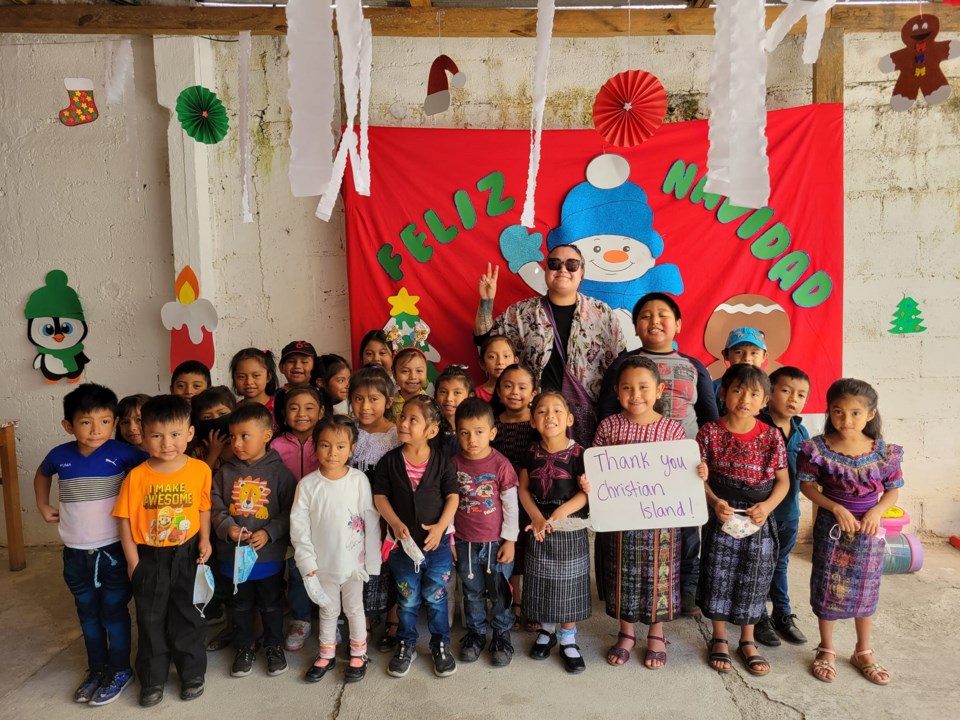A Beausoleil First Nation community member is helping to empower Indigneous children in Guatemala by volunteering through Fundamaya, an organization she holds close to her heart.
Trista Madsen, 38, arrived in Panajachel, Guatemala last month along with Christmas gifts donated by her community to deliver to the children living there.
"I started my fundraising on the (Christian) island one week before I left and I thought it would be amazing to have our community be a part of what I'm doing.” Madsen said.
“I just recently moved back to my (Guatemalan) community, but am always excited to see what's new and if there's any opportunity I can help with."
Madsen is helping the Mayan peoples in the small town of Panajachel, which is located in the southwestern Guatemalan Highlands, less than 140 kilometres from Guatemala City.
Founded in 2007, Fundamaya is a charitable non-profit organization that collaborates with marginalized Indigenous Mayan communities by providing access to education, nutrition, shelter and healthcare. The organization also works with volunteer groups who come to help with various on-the-ground needs such as building stoves, distributing water filters, activities at preschools and serving the elderly.
The organization was born from the vision of a group of Indigenous Guatemalan, Australian and American friends wanting to make a difference for those most in need.
Madsen pays for her own travel, but the organization helps her with accommodations in the heart of the community where she will be volunteering until the end of February.
Although Marsden doesn’t consider herself to be an activist, she is no stranger to community organizing and helping various causes.
When she was 25, she organized a cancer awareness campaign that saw her bike from Christian Island to Niagara Falls. She has also raised awareness for the homeless and spent a night in the cold in January one year to give attention to those who struggle and need support.
Madsen first travelled to Guatemala five years ago where she met Fundamaya’s co-founder and director Sharon Smart.
“I came here for a vacation with my mom which grew into so much more,” she said. “I met Sharon Smart and she told me about Fundamaya and so I started volunteering for the children every year.
“At first, it was cooking for the preschool kids and helping with daily hygiene and Spanish. I was also learning so it helped me learn basic Spanish.”
Fundamaya co-founders Smart and Dwight Mara first met while travelling in Guatemala and fell in love, not only with each other, but the area and people and felt a need to give their heart and skills to the Mayan people.
Although they are non-Indigenous, Fundamaya’s board of directors is made up of members of the Mayan community, who help bring their culture into the programming. In 2019, Fundamaya partnered with Action Alliance International, U.S. based organization that helps with cultural exchanges and assists in providing education and food needs.
As for Madsen, through her desire to help people and the community, she is also part of an Indigenous prophecy from both Indigenous Peoples of North and South America that talks about the Eagle and the Condor.
Don Alejandro Oxlaj is a seventh-generation priest from Guatemala and head of the Quiche Maya Elder Council. He has travelled throughout North America, comparing the native prophecies of different tribes.
“Those of the centre will unite the Eagle of the north with the Condor of the south,” he said. “We will come together with our brothers and sisters because we are one, like fingers on the hand.
“Help us bring this message to all corners of the planet Earth,” he said in a documentary film called Shift of Ages: Mayan Prophecies and the Eagle and the Condor.
Madsen added, “I personally love my culture, and the further I travel in Central America, the more I realize our cultures and practices are exactly the same, just with different medicines. I think that’s why I probably feel at home when I travel these parts of the world…cause the Indigenous people here are our brothers and sisters.”



